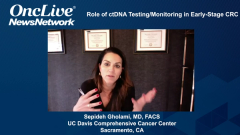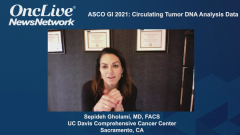
ctDNA Monitorization Length and Clinical Experience
Experts in the management of colorectal cancer (CRC) consider how long patients with early stage disease should receive ctDNA (circulating tumor DNA) monitorization, and provide insight into their personal experience using ctDNA testing.
Christopher Lieu, MD: In terms of how often we should be monitoring a patient with ctDNA [circulating tumor DNA], Dr Gholami, do you have any opinions about that? We don’t really know the answer, but do you have any opinions in terms of how often we should monitor ctDNA?
Sepideh Gholami, MD, FACS: It depends on where you practice. I can tell you at UC [University of California] Davis Comprehensive Cancer Center, our group uses it as an adjunct to the other surveillance imaging studies as well as a CEA [carcinoembryonic antigen] supplement, and we get it every 3 months; that’s really what we use here. I know of some other places where they’re using the Signatera protocol and whole exome sequencing, and that’s included in a 6-week package. I am curious to see what your experience is where you’re practicing and how often you are using it.
Christopher Lieu, MD: It’s all over the place, as you might imagine, because nobody really knows how often monitoring should be done. When you think about longitudinal testing of ctDNA in the curative setting, a lot of people agree that a ctDNA test every 3 months is a good way to longitudinally look. Simply put, some people choose to get a ctDNA test postoperatively, and that’s the only test that they’ll ever get. Some people really try to get that testing done on a regular basis to confirm that they’re not going to turn into somebody who’s ctDNA positive, or to confirm that they remain ctDNA negative. Dr Gholami and I are going to talk about some abstracts from the most recent ASCO GI [American Society of Clinical Oncology Gastrointestinal Cancers Symposium] in regard to additional data that are out there.
But before we do that, we want to answer, what has been your clinical experience personally with ctDNA testing? Have you noticed any limitations of the current assays that we’re using?
Sepideh Gholami, MD, FACS: The benefits that we already talked about are in the adjuvant setting—it’s changed the treatment of some patients. I also do liver surgery—that’s my main focus. We’ve even had a metastatic case in which the patient was undergoing a curative resection but had a single lesion, and we didn’t want to give any additional chemotherapy; in these instances, we’ve used it too. So it’s really interesting to see this wide range of clinical practice, and hopefully we’ll get more data in the future to confirm and validate the studies.
The limitation is sometimes the turnaround time. These specific tests need tissue, and sometimes that process can take 3 to 4 weeks. In patients with a form of lung metastatic disease or peritoneal disease, it is not a great test in terms of sensitivity. Those are the general limitations, but in comparison with what we have conventionally, it seems far better.
Christopher Lieu, MD: I totally agree. My experience has been similar. Your mention of the hepatic metastasectomy population is of significant interest, right? Because there are so much conflicting data in terms of how much our chemotherapy truly impacts overall survival in that setting. Our surgeons go in there, take out the disease—how much does preoperative or postoperative chemotherapy really help? I wonder if ctDNA will help better define the population that may actually benefit from adjuvant chemotherapy.
There are 2 running themes that both you and I will tell our audience. This information is readily available. Our patients are asking about it. What we are lacking—and you’re going to hear this as a theme—is that the prospective clinical trial data will tell us if we have a patient that’s ctDNA positive or ctDNA negative. What are some interventions that we can do? Can we escalate treatment in those patients who are ctDNA positive? Can we de-escalate treatment in patients who are ctDNA negative? This is what we want to answer so that we know exactly what to do with a test.
We’re at this point where the testing is helpful. It provides the strongest prognostic information that I’ve ever seen in colorectal cancer. If you’re ctDNA positive, a lot of studies are showing 100% relapse rate, and if you’re ctDNA negative, we know that those patients are going to do the best. Can we really impact that with our adjuvant therapy? That’s the next step in terms of how we’re going to utilize these tests.
Transcript Edited for Clarity










































